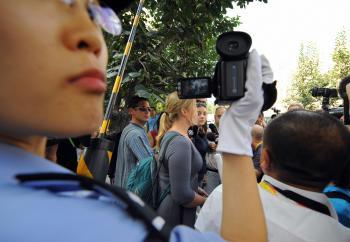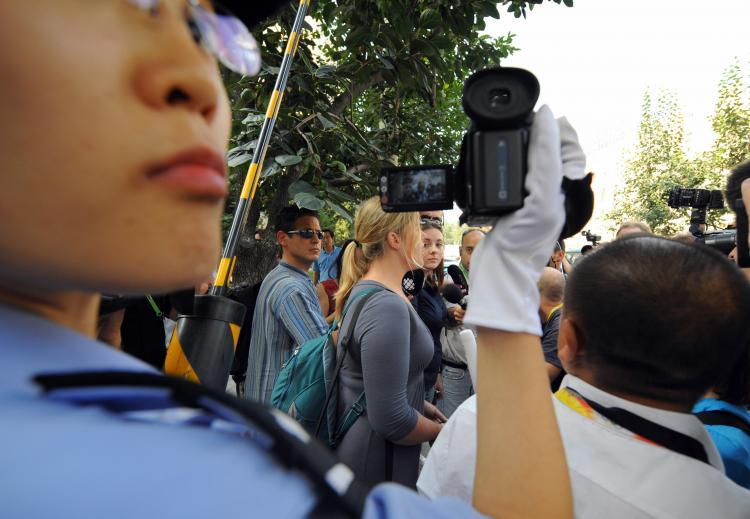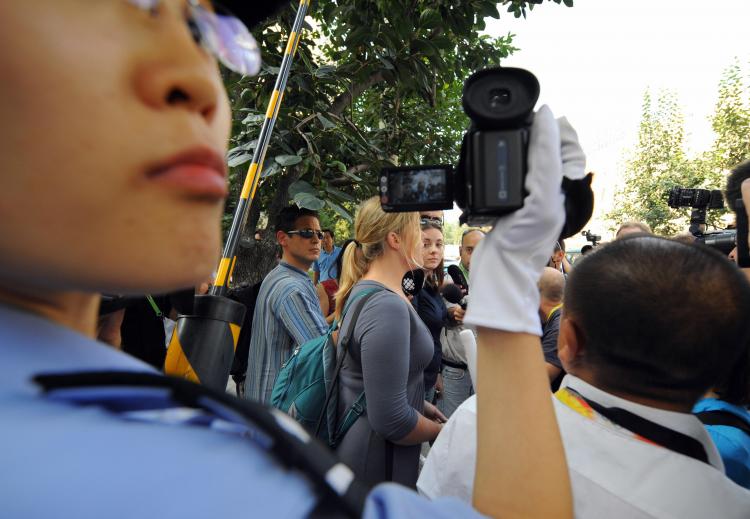Five foreigners were sentenced to a “10-day administrative detention” on Tuesday after the group attempted to document a pro-Tibet protest in Beijing. Among the group were video bloggers Brian Conley and Jeff Rae, cited for their previous footage and photography of protests in Beijing which have been published on pro-Tibetan websites.
Students for a Free Tibet report that the group is being held with James Powderly, artist and co-founder of the Graffiti Research Lab who planned to debut a new protest technology. The L.A.S.E.R. Stencil technology is designed to put messages on buildings and walls using light.
“The heavy-handed treatment by police of anyone holding a camera to gather news during the Olympics is of great concern,” said the Committee to Protect Journalist (CPJ)’s Asia program coordinator Bob Dietz in a press release. “Authorities in China must accept that the world wants to see documentation of incidents they would rather play down. Detentions and harassment are not the answer.”
According to CPJ, two Associated Press (AP) photographers were roughed up on Thursday, August 21, while covering a separate pro-Tibet protest in Beijing. The memory cards from their cameras were confiscated.
Eowyn Rieke, wife of the sentenced blogger Brian Conley, said in an interview with the Philadelphia Inquirer that they had suspected the Chinese Communist regime could lash out against any effort to let the world know about Tibet.
“We knew that the Chinese government is extremely repressive and that they might respond to any effort to get the word out about Tibet strongly,“ said Rieke, a doctor who is pregnant with her first child. ”I have been stressed and worried, but overall, in the context of things, what he is experiencing is pretty minor compared to what many people have at the hands of the Chinese government.”
On Thursday international media rights organization Reporters Without Borders (RSF) said in a press release that they had received documents sent to Chinese police stations at the end of July about handling foreign media. “The rules for the foreign press adopted in January 2007 were simple and explicit - freedom of movement and freedom to interview,” RSF said.
RSF said the documents, dated July 25, said police should investigate Chinese citizens who talk to the foreign press even while allowing these journalists the freedom to conduct interviews.
But there have been many incidents of direct interference in the work of foreign journalists. On August 13 Chinese police arrested and manhandled British reporter John Ray when he and his cameraman attempted to cover a pro-Tibet protest.
Police also destroyed the materials and equipment of a photographer for the London-based Guardian newspaper, while in Xinjiang AP photographers were forced to delete the photos they had taken.
One of the official documents, by the Criminal Affairs Bureau (CAB), analyzes three events involving pro-Tibet activists, Christians and a delinquent. Police are instructed to carry out a thorough investigation and avoid bad publicity. The CAB recommends arresting foreign demonstrators and deporting them as quickly as possible while doing everything to “de-politicize” the situation.
Another document says religious cases should be dealt with “as quickly as possible,” and police should “keep the crowd at a distance, devise all sorts of ploys to defuse the situation and immediately inform the Religious Affairs Department.”
Students for a Free Tibet report that the group is being held with James Powderly, artist and co-founder of the Graffiti Research Lab who planned to debut a new protest technology. The L.A.S.E.R. Stencil technology is designed to put messages on buildings and walls using light.
“The heavy-handed treatment by police of anyone holding a camera to gather news during the Olympics is of great concern,” said the Committee to Protect Journalist (CPJ)’s Asia program coordinator Bob Dietz in a press release. “Authorities in China must accept that the world wants to see documentation of incidents they would rather play down. Detentions and harassment are not the answer.”
According to CPJ, two Associated Press (AP) photographers were roughed up on Thursday, August 21, while covering a separate pro-Tibet protest in Beijing. The memory cards from their cameras were confiscated.
Eowyn Rieke, wife of the sentenced blogger Brian Conley, said in an interview with the Philadelphia Inquirer that they had suspected the Chinese Communist regime could lash out against any effort to let the world know about Tibet.
“We knew that the Chinese government is extremely repressive and that they might respond to any effort to get the word out about Tibet strongly,“ said Rieke, a doctor who is pregnant with her first child. ”I have been stressed and worried, but overall, in the context of things, what he is experiencing is pretty minor compared to what many people have at the hands of the Chinese government.”
On Thursday international media rights organization Reporters Without Borders (RSF) said in a press release that they had received documents sent to Chinese police stations at the end of July about handling foreign media. “The rules for the foreign press adopted in January 2007 were simple and explicit - freedom of movement and freedom to interview,” RSF said.
RSF said the documents, dated July 25, said police should investigate Chinese citizens who talk to the foreign press even while allowing these journalists the freedom to conduct interviews.
But there have been many incidents of direct interference in the work of foreign journalists. On August 13 Chinese police arrested and manhandled British reporter John Ray when he and his cameraman attempted to cover a pro-Tibet protest.
Police also destroyed the materials and equipment of a photographer for the London-based Guardian newspaper, while in Xinjiang AP photographers were forced to delete the photos they had taken.
One of the official documents, by the Criminal Affairs Bureau (CAB), analyzes three events involving pro-Tibet activists, Christians and a delinquent. Police are instructed to carry out a thorough investigation and avoid bad publicity. The CAB recommends arresting foreign demonstrators and deporting them as quickly as possible while doing everything to “de-politicize” the situation.
Another document says religious cases should be dealt with “as quickly as possible,” and police should “keep the crowd at a distance, devise all sorts of ploys to defuse the situation and immediately inform the Religious Affairs Department.”







